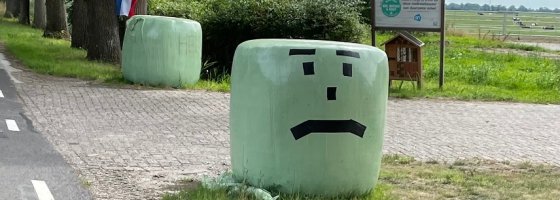Blog post
Family history and the Dutch countryside
Ilja Bouwknegt has just started her MSc thesis year with FNP. She reminisces about the roots of her decision to research into how humans interact with our landscape.

There are photos of me – five years old – wearing a red bandana and blue coveralls sitting in the seat of a tractor as if I’m driving it. When I was eight, I had a birthday party at my uncle’s dairy farm in which he took one of his calves out of its pen and my little gang of friends sat around it with tiny canvases and painted the animal. When my grandparents stopped with their farm, it went to my uncle – my dad went to university. Growing up in the countryside, always a fifteen minute ride from my dad’s side of the family, that farmers’ lineage has never felt like something far from who I am as a person. While I consider both my grandparents to be storytellers about the Dutch countryside (for better or for worse), my grandma adheres the most to the idea that being a farmer is a personality trait rather than a profession. When I told her I would do my Master’s thesis about something that links nature conservation to Dutch farmers, she said: ‘of course you’re doing that, that’s your farmers’ blood. Nobody cares about nature as much as farmers.’
I don’t agree with her, but that doesn’t matter. I think we see and experience the same things – the Dutch countryside, being outdoors, being some kind of shepherd of your environment and caring for it deeply – and interpret it through different lenses. It’s precisely that difference in interpretation that keeps intriguing me. In the summer of 2022 the Dutch farmers blocked the countryside, claimed it theirs and not the government’s (‘what would the government know about farmers and nature, or policy for that matter?’). They up flags and farmer symbols on every lamp post, statue, fence, tree. I was taking care of my grandma at the time – heart attack – and would walk the dog past these unnerving, angry symbols that I felt did not allow for any criticism or dialogue. I commented to my grandma that I should create my own counter-slogans and put them up next to theirs to show the villagers that there are other opinions out here and wide-eyed she warned me not to. It became a lonely summer, though this experience is what kickstarted my curiosity for my thesis topic. How can a nature conservationist argue for nature conservation policy in a countryside that rejects all policy? How does such a movement start, why (and when) did it turn its back onto conservation?
For me, annoyed as I tend to be with everything happening in my home region, a deep love for ‘my’ rural landscape (and, alright, my family) prevails. Some weekends are set aside to return and walk along the endless fields and grassy heathlands. I know why the landscape looks the way it looks, what its ailments are, ways to bring life back. Now, I have a drive to understand everyone that interacts with this same landscape. To understand the way they see it, what they love about it, what they dislike. I keep telling everyone who cares to listen: actually, my thesis process is not so bad so far. It is really nice to dive so deeply into something I care about.
Ilya’s thesis is provisionally titled ‘The Dutch farmers’ movement: Framing processes and mobilization against the Nature Restoration Law’. Her supervisors are Georg Winkel and Jasmijn Keuning.